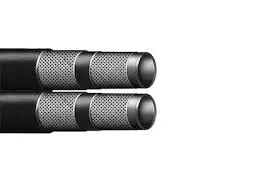Dec . 04, 2024 05:23 Back to list
Hydraulic Hose Certification Requirements by MSHA for Safety and Compliance
Understanding CE Certification and MSHA Regulations for Hydraulic Hoses
In the industrial world, safety and compliance are paramount, especially in environments like mining and heavy machinery operation where hydraulic systems are prevalent. Hydraulic hoses serve as essential components in these systems, transferring power and fluids between various parts of the machinery. However, to ensure their safety, reliability, and efficiency, hydraulic hoses must meet specific regulatory standards. Among these standards are CE certification and MSHA (Mine Safety and Health Administration) regulations.
What is CE Certification?
CE marking is a certification mark that indicates conformity with health, safety, and environmental protection standards for products sold within the European Economic Area (EEA). In the context of hydraulic hoses, CE certification signifies that the product has been rigorously tested and meets EU safety requirements. This includes aspects such as
1. Material Quality The raw materials used in the manufacture of hydraulic hoses must be of consistent and high quality to ensure durability and resistance to wear and tear.
2. Design Standards Hydraulic hoses need to be designed in accordance with applicable European directives, which may include the Pressure Equipment Directive (PED) and the Machinery Directive.
3. Performance Testing CE certification involves extensive testing under various conditions to ensure that the hoses can operate safely and effectively without failure.
The CE marking not only serves as evidence of compliance but also provides manufacturers with a competitive advantage in the European market, as it enhances customer confidence in the safety and quality of their products
.MSHA Regulations
ce certification msha hydraulic hose

On the other side of the Atlantic, the MSHA, a U.S. governmental agency, enforces safety regulations for mining operations. Their guidelines are crucial for products used within the mining industry, including hydraulic hoses. MSHA regulations focus on ensuring that all equipment used in mining operations is safe and does not pose any hazards to workers. Key aspects include
1. Flame Resistance Hydraulic hoses used in mines must be manufactured with materials that are flame-resistant to mitigate the risk of fire in potentially explosive environments.
2. Environmental Adaptability Hoses must be able to withstand the harsh conditions prevalent in mining operations. This includes exposure to extreme temperatures, abrasion, and hydraulic fluids that can deteriorate certain materials.
3. Operational Integrity MSHA regulations require that hydraulic hoses maintain integrity under high pressure and mechanical stress, which are common in mining operations.
The Synergy Between CE Certification and MSHA Regulations
While CE certification and MSHA regulations are established in different regions and industries, they share a common goal ensuring the safety and reliability of hydraulic hoses. Manufacturers often pursue both certifications to cater to a wider market and ensure their products meet robust international safety standards.
For instance, a hydraulic hose that is CE certified for the European market can still be designed to meet MSHA standards for the mining industry. This dual compliance not only enhances the product's reliability and marketability but also reinforces the manufacturer's reputation in terms of quality and safety.
Conclusion
In summary, CE certification and MSHA regulations are essential standards concerning hydraulic hoses used in various industrial applications. Understanding these requirements is vital for manufacturers aiming to market their products effectively while ensuring the safety of end-users. By prioritizing quality, safety, and compliance with these regulations, manufacturers can play a significant role in protecting the well-being of workers in high-risk environments, ultimately contributing to a safer industrial landscape. As industries evolve and safety standards become increasingly stringent, the integration of CE certification and MSHA compliance will continue to be essential for hydraulic hose manufacturers worldwide.
-
Best Four Steel Wire Spiral Hose Hydraulic R12 – Durable High-Pressure Hose Manufacturer
NewsJul.08,2025
-
High-Quality 1/4 Hydraulic Hose – Soft, Flexible & Durable Rubber Hoses for Industrial Use
NewsJul.08,2025
-
1 1 2 Inch Hydraulic Flexible Hose - Durable, Reliable, High-Pressure Solutions
NewsJul.07,2025
-
High-Quality 1 2 Rubber Hose - Durable, Flexible Hydraulic Solutions
NewsJul.07,2025
-
Discover SAE Hydraulic Hose Types - High Quality & Durable Hoses from Leading Factory Supplier
NewsJul.06,2025
-
High Pressure Wire Hydraulic Rubber Hose Supplier Durable & Reliable 1SN Hose Solutions
NewsJul.06,2025
